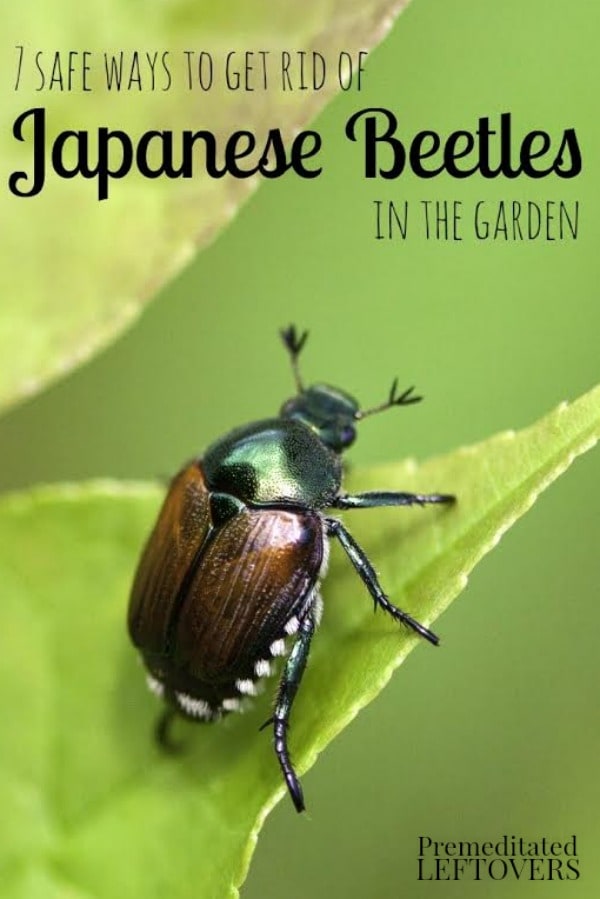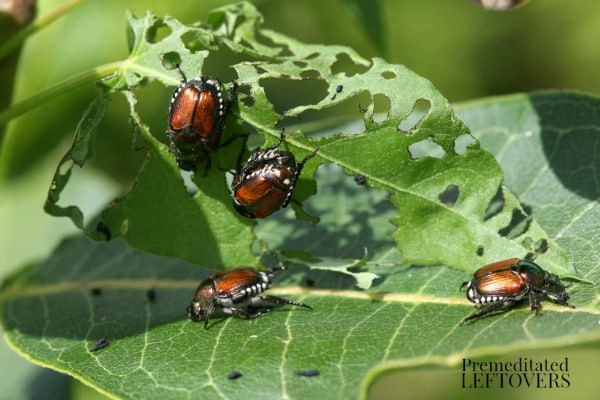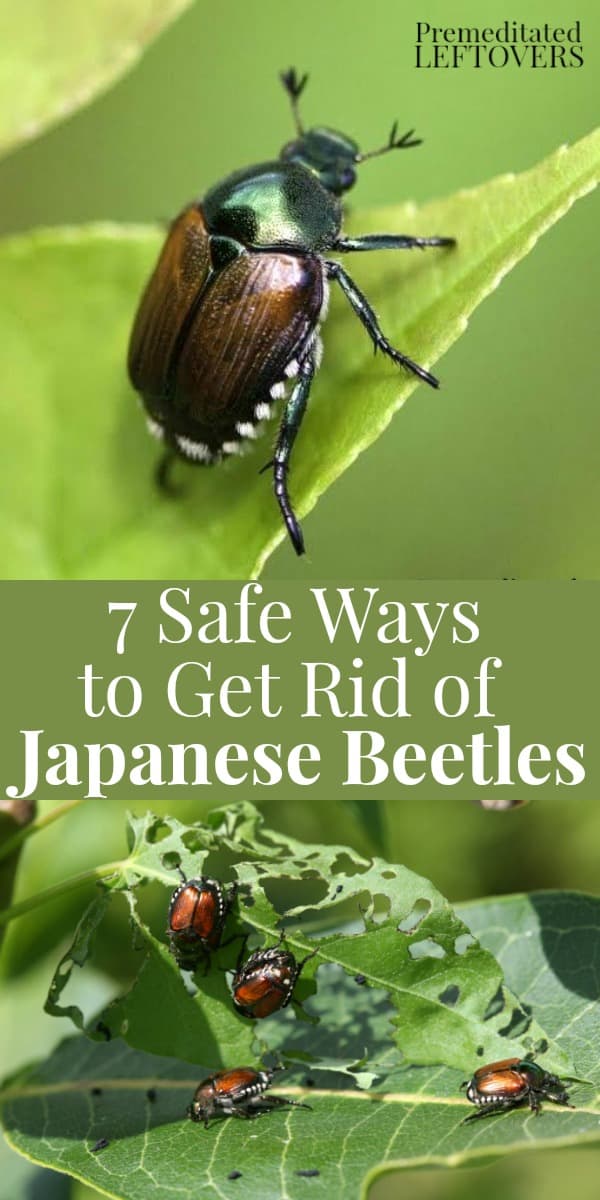Have you discovered Japanese beetles in your yard? If so you are wondering how to get rid of Japanese Beetles! Here are safe ways to get rid of Japanese Beetles in the garden. These methods are mostly natural and do not include using harsh chemicals.
Japanese beetles are one of the worst pests to have around your garden. They can wreak a ton of havoc, and in no time at all the plants and leaves look terrible. Fortunately, there are some ways you can battle against these bugs and get rid of Japanese beetles in your garden – and in a safe manner too!
If you enjoy gardening but hate seeing your plants get destroyed by these pests, check out the 7 Safe Ways to Get Rid of Japanese Beetles in the Garden below.
7 Safe Ways to Get Rid of Japanese Beetles in the Garden
1. Handpicking: Removing the Japanese beetles you see manually may be time-consuming, but it’s one of the most effective ways to get them out of the garden. Fill a bucket with hot soapy water and hold it beneath the plants as you gently shake them. The bugs will fall into the water and drown by morning. The smell they give off in the bucket will help fend off other beetles.
2. Baby Powder: Using baby powder is a great deterrent for smaller gardens or just a selection of plants. Sprinkle the leaves with the powder, just enough for a dusting. This will alter the taste and smell of the plants, leaving them undesirable to the beetles. Make sure you sprinkle on more baby powder after each rain.
3. Clean Up: Japanese beetles are attracted to an area by rotting wood or diseased plants. Before it’s time for them to start coming around, be sure to clean up your yard, particularly the area around your garden.
4. Garlic: The scent of garlic is unappealing to many garden pests, and Japanese beetles are no exception. You can use garlic one of two ways. First, plant garlic as an outer border for your garden to keep the bugs away. Secondly, make a spray using garlic powder and baby oil. Spritz the leaves with it every few days to keep the beetles from munching on your plants.
5. Milky Spores: Milky spore is an organic repellent for Japanese beetles. It infects the grubs before they reach the beetle stage. When they die, they release even more milky spores into the ground, killing more grubs. This method can take a year or two to fully be effective, but it can work well for 10-15 years once implemented.
6. Nematodes: Nematodes work similar to the milky spores in that they kill grubs after entering their body. When used in combination with milky spores, nematodes can greatly reduce and control the Japanese beetle population around your plants.
7. Plan your Planting: There are some plants that Japanese beetles tend to gravitate to way more than others. If you have a huge pest problem, it may be best to stay away from their favorites. Japanese beetles like apple, birch, rose, crape myrtle, pin oak, cherry, and plum. Opt for plants least favored by the beetles, such as ash, redbud, magnolia, hemlock, dogwood, and boxwood.
Do you know of another safe way to get rid of Japanese beetles? Let us know in the comments!
More Ways to Get Rid of Garden Pests:
7 Natural Ways to Repel Rabbits from your Garden
Using Ladybugs to Naturally Eliminate Aphids




Angela says
Japanese Beetles love geraniums, yet die when eating them. I’ve purchased several plants and am looking forward to them dying off!! They’ve destroyed a ton of my apple trees’ leaves and ate ALL of my cherries this year before we got any!
Victoria says
I would like a method to kill Japanese beetles that targets the beetle and that does not kill the honey bees and other native bees and wasps in my garden. I live in the Dayton Ohio area. I have a small raised bed garden about 16 ft x 20 ft. I have used the beetle bag traps with the attractant hormone inside, but within a half hour the bag is full to the top. As you can guess, the sheer number of beetles makes it impossible to hand pick them. I have had some success with underplanting roses and hydrangeas and surrounding my beds with hot pepper plants such as jalapeño, Serrano, or Thai bird peppers, but it was only effective in protecting short plants up to 3 – 3 1/2 feet tall. My roses grew to 8 ft, so the bottom half was untouched and the upper half devasted and smothered in beetles. I have also underplanted with mint, but mint must be put into a separate pot, not planted in the ground, because mint is very invasive.
This year the infestation is so bad that I have even used Sevin, a multi-spectral insecticide, out of desperation, and the Japanese beetles were totally unaffected. In fact, the day after spraying Sevin on my potatoes, I went outside and the beetles were mating in the plants I’d sprayed.
Suzanne Brooks says
The commercial traps are great. It consists of plastic bags, narrow in the midddle, filled with a sweet smelling bait and hung in the tree or bush. The beetle goes in and can’t get out. I rinse and reuse them (for three years now). Hope I can find them again next summer.
Kathy says
I too use the hanging commercial traps, obtained at my garden store. The instructions say to put them a good distance (about 18-20 feet) from the raspberry plants I want to protect, to draw the beetles away from them. I have enough room to put one on each side of the berry plots — and they do seem to keep the darn critters away quite well, enough so that I still get 2 crops of raspberries with their use (I have raspberries that bear twice each year). And the traps get quite full of the darn bugs, so they obviously work! I live in Colorado and we’ve never had them here before the last 2-3 years, but now they’ve begun to migrate west from the east where they started, so I’m grateful that there is a solution available.
DAVE says
Yes I have and it kicks there butt
…use it early in the morning or towards evening below 8t degrees. It works fast love this stuff.
Diane says
My entire raspberry patch was destroyed this year, by the Japanese Beetles. And now that are destroy both of my gardens and roses and any flowers I have.
I purchased Ortho Spray for Japanese Beetles and Milk Spore. I just received the spray yesterday, but am worried with all the rain and storms we are having in Wisconsin, how often I will need to apply it.
I’m ready to just ready to rotor till up my gardens and cut my flowers down.
Has anyone tried this Ortho spray?
Janet says
Yes and I love it. It does not seem to be harming the bees, but works immediately on the beetles!
Colleen says
Neem oil. Sprayed on the plants or water plants with a neem oil solution. Won’t kill the beetles immediately but will stop them from reproducing. Neem oil dosent harm bees.
Danielle says
Neem does in fact kill bees just as it kills the other insects. The key is in the timing of when you spray it. Like in late afternoon or evening when no bees are out.
Rhonda says
I also discovered that Neem oil is not bee friendly. As Danielle says above, do your spraying when the bees have gone to bed.
Mark says
Would bees be around my fruit trees when there are no flowers? Looking to spray my cherry trees with a mix of dawn and neem oil in water
S dhillon says
We India don’t see these adults much but there are grubs in soil which prefer to the max ladyfingers roots, you can find one to three below each drooping ladyfingers plants
Paula Robinson says
I never have this problem because my chickens love to eat them! Matter of fact my neighbors don’t have them anymore either.
Michael says
I have to keep my chickens out of the garden or I won’t have any vegetables.
Marilyn says
Tried garlic, and garlic mixtures, did not work at all. We have a new clean garden so rotting wood and decayed plants not a factor.
Catching them appears to be most effective, but time consuming. Netting I think would be the easiest way to control them.
Laurie says
It is important to keep your yard cleaned up and remove all dead matter – old leaves, sticks, rotted wood, etc. out as some insects are attracted to those types of materials. Great tips on natural repellents, thanks for sharing!
Wanda says
I hate them😬 my husband is actually cutting off my crape myrtle blooms just to make them go away but then they went after my roses and canons 😩.. worst ever this year in Southern IL.
Pam says
My roses and cannas are being attacked this year for the first time in WI.
Ken D. Orlich says
We tried garlic in every way you can imagine, from planing nearby to chopping it up and spraying. Not effective here in the Lansing, MI area anyway. Looking into milky spore now. Want to stay organic.
Ken D. Orlich says
*planting nearby
mary jo mcIntyre says
I put down milky spore 2 years ago here in lapeer Michigan It has worked great. of course Japanese beetles can fly in too but I am attacking them from the ground up I also hand pick in the mornings and everytime I get a few minutes but not many in the garden last year Just be diligent and you will see a big difference
Lo says
They come from grubs. Spray your lawn for gribs and you wont have beetles.
Sandra says
They fly great distances so they aren’t necessarily hatching in your turf.
Rhonda says
So, so true. I made the mistake of putting out those yellow traps. All I did was attract all the neighbors beetles to my yard. I am using Milky Spore, applied last fall. I’m hoping that will keep the dang things somewhat in check. Milky Spore is a product that doesn’t damage the environment. Check it out.
Bev says
We used grub control every Spring and this year we have Japanese Beetles!
Julie Kraft says
They are here and I am battling them,ugh
4 TBLS Dawn dish liquid with water in a spray bottle. Spray the beetle,it kills them.👍
Phyllis says
I haven’t seen a single grub in my yard but we’re infested with Japanese beetles😡